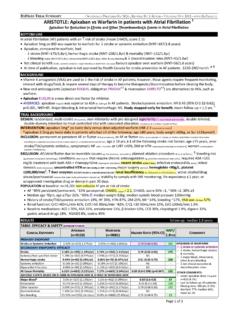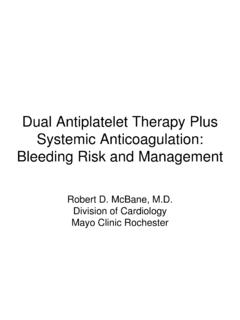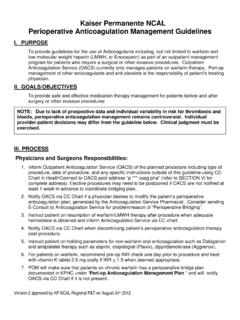Transcription of Guidelines for Use of Clopidogrel (Plavix®) - oscarmanual.org
1 East Lancashire Medicines Management Board representing East Lancashire Hospitals NHS Trust, Lancashire Care Trust, Blackburn with Darwen PCT, East Lancs PCT Date of approval by East Lancs Medicines Management Board: 16 March 2004. Reviewed November 2006; Date of next review November 2008. Available online at Page 1 of 5 Guidelines for Use of Clopidogrel (Plavix ) Licensed IndicationsClopidogrel is only indicated for the secondary prevention of atherothrombotic events in: Patients suffering from acute myocardial infarction with ST elevation (STEMI ACS) (initiated from a few days after the event until less than 35 days), ischaemic cerebral infarction (initiated from 7 days after the event until less than 6 months) or established peripheral arterial disease (PAD). Patients suffering from non-ST segment elevation acute coronary syndrome (unstable angina, non-Q-wave myocardial infarction, or NSTEMI ACS) in combination with aspirin (ASA).
2 Summary of Prescribing Recommendations NSTEMI ACS including those who are to be managed with percutaneous coronary intervention (with or without stent) or coronary artery bypass graft surgery (CABG), aspirin and Clopidogrel for 12 months then aspirin monotherapy (see notes below) STEMI ACS as alternative to primary angioplasty, aspirin, Clopidogrel and standard fibrinolytic therapy for 28 days, then aspirin monotherapy IHD or PAD with genuine aspirin intoleranceand NO atrial fibrillation Clopidogrel monotherapy (see notes below for genuine aspirin intolerance) atrial fibrillation with IHD, previous ischaemic cerebral infarction, diabetes, hypertension, valve disease or LVF -see East Lancs Guidelines on Stroke Risk Evaluation in AF (15)Drug eluting and other stents (DES) aspirin and Clopidogrel for twelve months, then aspirin monotherapy Recurrent cerebral infarction - In patients with recurrent cerebral infarction or TIA despite combined treatment with aspirin/dipyridamole, Clopidogrel alone may be used on specialist recommendation only; there is little evidence to guide practice in these patients (11,14) Avoid ClopidogrelFor primary prevention.
3 In active pathologic bleeding such as active peptic ulcer or intracranial hemorrhage (contraindication) Severe liver disease (contraindication) Breast-feeding (contraindication) Prescribing ClopidogrelConsider Clopidogrel If a patient already taking aspirin suffers a subsequent cerebrovascular accident (CVA), aspirin could be continued in combination with dipyridamole first line(3) or Clopidogrel alone as second line, after considering any modifiable risk factors ( hypertension, diabetes). There is no published evidence to support the combination of aspirin with Clopidogrel in this indication Stable angina there is no evidence base to provide guidance; Clopidogrel could be considered in genuine aspirin intolerance Clopidogrel Recommended 1. Acute Coronary Syndrome (NSTEMI ACS) In combination with aspirin for patients with non-ST segment elevation acute coronary syndrome who have elevated cardiac enzymes.
4 Treat for 12 months maximum, then continue aspirin only. Duration of treatment must be clearly specified on discharge. If a patient with ACS is at high risk of MI or death (TIMI score 5-7), and the cardiologist indicates this in the discharge summary, treatment with Clopidogrel combined with aspirin may be continued beyond 12 months 2. MI with ST-segment elevation (STEMI ACS) Patients who have experienced STEMI are at high risk of another heart attack, cerebral infarction or death. In combination with aspirin and a standard fibrinolytic regimen, treat for 28 days (12,13) Page 2 of 5 3. Cardiovascular Disease - For patients with IHD, ischaemic cerebral infarction, TIA or peripheral artery disease who are unable to take aspirin due to contraindication, or known allergy (bronchospasm or rash).
5 4. Stent Insertion - In combination with aspirin for patients undergoing drug-eluting stent procedures (unlicensed indication). Treatment duration should be no longer than 12 months.(4) GPs and patients should be advised that this is unlicensed use. 5. Ischaemic cerebral infarction or TIA MR dipyridamole and low-dose aspirin for 2 years from the most recent event, provided well tolerated, then low-dose aspirin monotherapy (14, 16). Antiplatelet prescribing in patients who have had a TIA or cerebral infarction should be considered alongside other secondary prevention measures, such as smoking cessation, blood pressure reduction and cholesterol lowering. 6. Recurrent cerebral infarction - In patients with recurrent cerebral infarction or TIA despite combined treatment with aspirin/dipyridamole, Clopidogrel alone may be used on specialist recommendation only; there is little evidence to guide practice in these patients (11,14) Antiplatelet prescribing in patients who have had a TIA or cerebral infarction should be considered alongside other secondary prevention measures, such as smoking cessation, blood pressure reduction and cholesterol lowering.
6 * Note: Clopidogrel has no antidote and can cause major problems if patients require urgent cardiac surgery. The 7-point Thrombolysis in Myocardial Infarction (TIMI) Risk Score 1. Age > 65 years 2. 3+ coronary artery disease factors (raised cholesterol, diabetes mellitus, hypertension, smoking, family history) 3. Greater than 50% coronary stenosis on angiography 4. Greater than ST segment deviation 5. 2+ anginal episodes in last 24 hours 6. Elevated biochemical markers of myocardial necrosis (creatine kinase myocardial bound; cardiac troponins I and T) 7. Use of aspirin in last 7 days The Evidence for ClopidogrelIs Clopidogrel better than aspirin? 200 patients treated for one year with Clopidogrel instead of aspirin would prevent one additional major ischaemic event at a cost of 92,000.(1) The risk of a new ischaemic event in the CAPRIE study for patients prescribed aspirin was and for those prescribed Clopidogrel .
7 Is Clopidogrel safer than aspirin? 1. Aspirin and Clopidogrel cause similar rates of GI adverse events.(1) In trials Clopidogrel 75mg was associated with slightly less GI irritation than aspirin 325mg. At lower doses of aspirin the risk of GI irritation would be reduced. 2. GI irritation with aspirin does not constitute a contraindication to low dose aspirin.(5) Genuine aspirin intolerance is defined by hypersensitivity reactions or severe dyspepsia - seen in approximately 6% of people. It should be differentiated from simple dyspeptic symptoms, which may also occur with Clopidogrel . In simple dyspepsia: Take aspirin with food, as recommended in the BNF Reduce dispersible aspirin dose to an effective and tolerated level Consider concurrent antacid, H2 antagonist, or proton pump inhibitor (PPI) (aspirin and PPI costs less than Clopidogrel ) 3.
8 Both drugs are associated with bleeding and both should be used with caution in patients with any pre-existing risk of bleeding. 4. Previous GI intolerance of NSAIDs is not a contraindication to low dose aspirin. 5. Clopidogrel is associated with higher rates of skin rash than aspirin. 6. Concurrent prescribing of PPI with Clopidogrel is difficult to justify. Patients needing maintenance PPI can safely take antiplatelet doses of aspirin with their PPI. (6-10) Page 3 of 5 References1. CAPRIE Steering Committee. A randomised blinded trial of Clopidogrel vs aspirin in patients at risk of ischaemic events (CAPRIE). Lancet 1996; 348 (9038): 1329-39 2. The Clopidogrel in Unstable angina to prevent Recurrent Events (CURE) Trial Investigators. Effects of Clopidogrel in addition to aspirin in patients with acute coronary syndromes without ST-segment elevation.
9 N Engl J Med 2001; 345: 494-502 3. Diener H et al. European stroke prevention study 2. Dipyridamole and aspirin in the secondary prevention of stroke. J Neurol Sciences 1996; 143: 1-13 4. Mehta, SR, Yusuf S, Peters RJG, et al. Effects of pre-treatment with Clopidogrel and aspirin followed by long-term therapy in patients undergoing percutaneous coronary intervention: the PCI-CURE study. Lancet 2001; 358: 527-33 5. UKMI. Frequently asked questions. In what circumstances might aspirin intolerance be an appropriate indication for Clopidogrel ? UKMI FAQ 27. March 2003 ( )6. Cryer B. Reducing the risks of gastrointestinal bleeding with antiplatelet therapies [Editorial]. N Engl J Med 2005; 352 (3): 287-9 7. Chan, FKL, Ching, JYL, Hung, LCT et al. Clopidogrel versus aspirin and esomeprazole to prevent recurrent ulcer bleeding. N Engl J Med 2005; 352 (3): 238-44 8.
10 WeMeReC Feb 04. Wong F-H, Wong, S-Y, Chen, W-H. Clopidogrel plus omeprazole compared with aspirin plus omeprazole for aspirin-induced symptomatic peptic ulcers/erosions with low to moderate bleeding/re-bleeding risk a single-blind, randomized controlled study. Alimentary Pharmacology and Therapeutics 2004; 19(3): 359-365 10. Prodigy guidance on CHD medicines management aspirin. Diener HC, Bogousslavsky J, Brass LM et al. Aspirin and Clopidogrel compared with Clopidogrel alone after recent ischaemic stroke or transient ischaemic attack in high-risk patients (MATCH): randomised, double-blind, placebo-controlled trial. Lancet 2004 Jul 24;364(9431):331-7 12. COMMIT/CCS-2 ( Clopidogrel and Metoprolol in Myocardial Infarction Trial):COMMIT collaborative group. Addition of Clopidogrel to aspirin in 45,852 patients with acute myocardial infarction: randomised placebo-controlled trial.







